|
|
|
Sort Order |
|
|
|
Items / Page
|
|
|
|
|
|
|
| Srl | Item |
| 1 |
ID:
146595
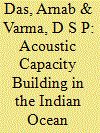

|
|
|
|
|
| Contents |
The fractured maritime mandate in India and the involvement of multiple agencies and ministries for matters maritime, make it complicated to achieve synergy. The UWR, Goa is a defence facility under the Ministry of Defence, the Ministry of Earth Science in mandated to provide R&D support for ocean related aspects, the we have the Ministry of Shipping and Ministry of Science and Technology as other players. It is known that there are close to 17 agencies and ministries of the Government of India involved in maritime issues. The huge resource and support required for UDA is possible only when all these agencies come together for a long term commitment to enhance our UDA in the IOR. A comprehensive Maritime Strategy formulation with clear focus on UDA is the only way forward to synergise the efforts of all the possible players involved. The Make in India initiative can be leveraged to contribute significantly to the Blue Economy with a clear maritime focus backed with an effective Maritime Strategy translating to enhanced Acoustic Capability in the future.
|
|
|
|
|
|
|
|
|
|
|
|
|
|
|
|
| 2 |
ID:
142809
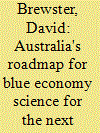

|
|
|
| 3 |
ID:
154505
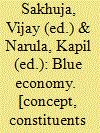

|
|
|
|
|
| Publication |
New Delhi, Pentagon Press, 2017.
|
| Description |
xxiv, 224p.hbk
|
| Standard Number |
9789386618047
|
|
|
|
|
|
|
|
|
|
|
|
Copies: C:1/I:0,R:0,Q:0
Circulation
| Accession# | Call# | Current Location | Status | Policy | Location |
| 059136 | 333.9164150954/SAK 059136 | Main | On Shelf | General | |
|
|
|
|
| 4 |
ID:
120028
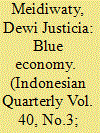

|
|
|
| 5 |
ID:
165527
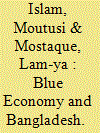

|
|
|
|
|
| Summary/Abstract |
In recent times, Blue Economy is emerging as an alternative development paradigm that balances economic use of oceans with environmental sustainability. With the depletion of land-based resources, countries around the world are turning their attention to the oceans as a new source of economic development and growth. Following the settlement of its maritime territory, Bangladesh is also working on utilizing oceanic resources with a view to becoming a developed country. In this backdrop, the paper is an attempt to examine the initiatives taken by different countries around the world to develop Blue Economy and identify important lessons that Bangladesh can learn from those experiences. The lessons include formulating a well-articulated Blue Economy plan, developing robust legal and institutional frameworks, emphasizing indigenous capacity development, prioritizing ocean research and innovation, protecting ocean environment as well as pursuing ‘Blue Diplomacy’ among others.
|
|
|
|
|
|
|
|
|
|
|
|
|
|
|
|
| 6 |
ID:
167748
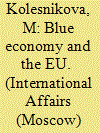

|
|
|
|
|
| Summary/Abstract |
THE UNITED NATIONS General Assembly Resolution "Transforming Our World: The 2030 Agenda for Sustainable Development," adopted on September 25, 2015, defined 17 Sustainable Development Goals (SDGs) and 169 targets. Achieving those objectives, which will be pursued by "all countries and interested stakeholders," should promote human prosperity and at the same time "secure the planet" [1]. A special target area, SDG 14, is devoted to the world's oceans and contains the phrase: "Goal 14: Conserve and sustainably use the oceans, seas and marine resources for sustainable development." It contains seven core objectives. The inclusion of maritime issues on the list of topics of special importance for life-sustaining human activity reflects the desire of the international community to strike a balance between developing maritime activity (economic, scientific research, military) and conserving the marine environment amid the growing impact of human actions.
|
|
|
|
|
|
|
|
|
|
|
|
|
|
|
|
| 7 |
ID:
158981
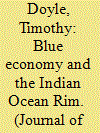

|
|
|
|
|
| Summary/Abstract |
‘Blue Economy’ (BE) (broadly conceptualizing oceans as ‘shared development spaces’) has emerged as a powerful and contested concept of in many of those 27 countries which are part of, either as Members States or Dialogue Partners, the leading Track One regional governance organization: the Indian Ocean Rim Association (IORA). The Indian Ocean Rim (IOR), with nearly half the world’s population by 2050, in geopolitical terms,
|
|
|
|
|
|
|
|
|
|
|
|
|
|
|
|
| 8 |
ID:
150586
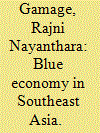

|
|
|
|
|
| Summary/Abstract |
While the term “blue economy” has found increasing traction with a variety of stakeholders (both state and non-state) in the recent past, a working definition of the concept at a regional or global level is yet to be arrived at. This paper begins with a brief examination of the concept of blue economy, followed by a discussion of blue economy initiatives undertaken or aspired towards at the regional level of Southeast Asia. In doing so, three fundamental propositions are made: First, the prospects for blue economy in Southeast Asia remain optimistic despite difficulties in collective action posed by the “ASEAN Way”, an obstacle which appears to have been considerably overcome in the launching of the ASEAN Economic Community (AEC) in 2015. Second, Indonesia’s growing economic and political profile allows it to assert the reins of regional (and even global) leadership on blue economy, without necessarily limiting itself to the Association of Southeast Asian Nations' (ASEAN) means and mechanisms. Third, while traditional security issues, both between Southeast Asian and extra-regional powers and within Southeast Asia over outstanding sovereignty and jurisdictional disputes, may impede cooperation on tackling non-traditional (maritime) security issues in the region, they may not prove as formidable an impediment against the successful realisation of blue economy initiatives.
|
|
|
|
|
|
|
|
|
|
|
|
|
|
|
|
| 9 |
ID:
142808
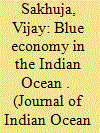

|
|
|
| 10 |
ID:
142477
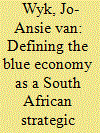

|
|
|
|
|
| Summary/Abstract |
In 2014, the South African government announced Operation Phakisa in order to stimulate the country's blue economy. Operation Phakisa's strong focus on maritime economic matters ignores two unresolved issues in respect of South Africa's maritime economy and maritime diplomacy, namely the country's extended continental shelf claim. If successful in its claim, South Africa's territory will increase significantly (thus a 10th province) and thus its security and economic opportunities and challenges. The latter includes the exploration and exploitation of extended shelf resources such as oil and gas, gas hydrates, seabed mining, and marine genetic resources. As very little legal precedent and state practice exists in respect of the actual delimitation of the extended continental shelf, South Africa's claims, which overlaps with that of its neighbours Mozambique and Namibia, could contributes to significant insecurity between these states. The paper concludes with some policy recommendations to address the overlapping claims, and promote an Indian Ocean–South Atlantic dialogue on oceans governance and maritime security cooperation.
|
|
|
|
|
|
|
|
|
|
|
|
|
|
|
|
| 11 |
ID:
142805
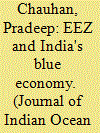

|
|
|
| 12 |
ID:
191030
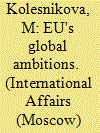

|
|
|
|
|
| Summary/Abstract |
THE European Union is steadily increasing its participation in shaping the global maritime agenda and asserting itself as a leading international player, setting key trends in the development of ocean governance. This trend can be seen in many EU conceptual and policy documents. In particular, the European Commission's 2022 Blue Economy Report uses the word "global" in various combinations 204 times and reflects the EU's main interests in modern international affairs, including "global food security," "global challenges," "global engagement," "global sustainable blue economy," "global leadership," "global partnerships," "global security and stability," etc..
|
|
|
|
|
|
|
|
|
|
|
|
|
|
|
|
| 13 |
ID:
175947
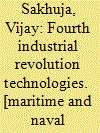

|
|
|
|
|
| Publication |
New Delhi, Pentagon Press and VIF, 2021.
|
| Description |
xxiii, 163p.Hbk
|
| Standard Number |
9789390095193
|
|
|
|
|
|
|
|
|
|
|
|
Copies: C:1/I:0,R:0,Q:0
Circulation
| Accession# | Call# | Current Location | Status | Policy | Location |
| 059937 | 359.07/SAK 059937 | Main | On Shelf | General | |
|
|
|
|
| 14 |
ID:
139052
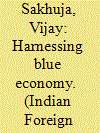

|
|
|
|
|
| Summary/Abstract |
Blue Economy is a relatively new concept and is resonating among a number of countries across the globe. It involves a number of interdependent sectors, which harness the wealth of the seas for economic growth through sustainable development to advance growth and enhance human security. Blue economy is slowly finding reference in the national maritime thinking among South Asian Countries and the national agendas acknowledge the potential of the seas for economic development. However, these countries face a number of technological and financial constraints to pursue the Blue Economy; but a pan-South Asian approach can help that dream come true.
|
|
|
|
|
|
|
|
|
|
|
|
|
|
|
|
| 15 |
ID:
175423
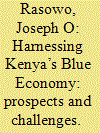

|
|
|
|
|
| Summary/Abstract |
Kenya enjoys a marine coastline of about 640 km giving a total area of territorial waters of 9700 km2 while the EEZ is 142,400 km2. She further lays claim to an extended EEZ of approximately 103,320 km2 and has 13,600 km2 of inland waters. The government recognizes the potential of this maritime resource to boost the country’s economic outlook and has made Blue Economy (BE) part of the economic pillar in its development blueprint. For effective development of the BE, Kenya needs, among other things, to: build human resource capacity through investing in marine education and training; boost marine scientific research; support the traditional industries of fisheries, aquaculture, tourism, blue biotechnology, ports and shipping; develop BE database; resolve outstanding boundary disputes; and reduce illegal unreported and unregulated fishing. The study posits that Kenya already has sector-wise experiences and assets as demonstrated by the numerous government institutions participating in the BE and is only lacking policy integration, coordination and coherence.
|
|
|
|
|
|
|
|
|
|
|
|
|
|
|
|
| 16 |
ID:
160248
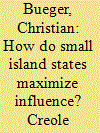

|
|
|
|
|
| Summary/Abstract |
A lack of capabilities is most often taken to imply a lack of influence. The foreign policy of the Seychelles provides a surprising case of successful small state diplomacy that counters this claim. With a population of less than 100,000 and a diplomatic service of 100 staff, Seychelles is recognized as a broker in international organizations and as an agenda setter in ocean governance. This article explores this success in four steps. First, we unpack why the current diplomatic success of Seychelles is a surprise. Second, drawing on literature on small state diplomacy, we identify three sources of small state influence: capability and location, political culture and institutional design, and political strategy. Third, we analyze recent Seychellois diplomacy in light of the four factors as well as the limitations of Creole small state diplomacy. We conclude by discussing what other small states may learn from the Seychelles.
|
|
|
|
|
|
|
|
|
|
|
|
|
|
|
|
| 17 |
ID:
181622
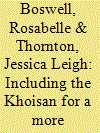

|
|
|
|
|
| Summary/Abstract |
This article proposes that including the Khoisan will produce a more inclusive Blue Economy in South Africa. Presently, economistic perspectives of the ocean, low regard for knowledge pluralism and historical stereotyping of Khoisan peoples, risk their further exclusion from ocean management in South Africa. Drawing on secondary data on Khoisan history and ethnography in South Africa, the article indicates the potential contribution of the Khoisan to South Africa’s Blue Economy, specifically, their contribution to a holistic and integrated environmental ethos. The authors also argue that South Africa is headed in the right direction by being a signatory to key UN conventions on heritage and the rights of indigenous peoples. However, government has yet to realize its commitments to the inclusion of the Khoisan in its ocean management efforts. The discussion has implications beyond South Africa, as it seeks to interrogate the place of First Peoples in global ocean management regimes.
|
|
|
|
|
|
|
|
|
|
|
|
|
|
|
|
| 18 |
ID:
193388
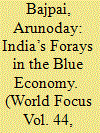

|
|
|
| 19 |
ID:
137764
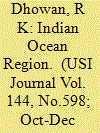

|
|
|
| 20 |
ID:
181625
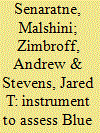

|
|
|
|
|
| Summary/Abstract |
The Blue Economy (BE) concept has come to particular prominence for coastal Indian Ocean (IO) countries, as well as Small Island Developing States (SIDS) in the region such as the Seychelles. Blue Economy entrepreneurship has emerged as a promising way to encourage sustainable economic growth. We developed an instrument for measuring Blue Economy entrepreneurship ecosystems (the network of resources and stakeholders that supports aspiring entrepreneurs). We applied this instrument to Seychelles, identifying local strengths and areas for improvement. This instrument has applicability beyond the Seychelles, and could be of further value for other countries hoping to encourage Blue Economy entrepreneurship.
|
|
|
|
|
|
|
|
|
|
|
|
|
|
|
|
|
|
|
|
|